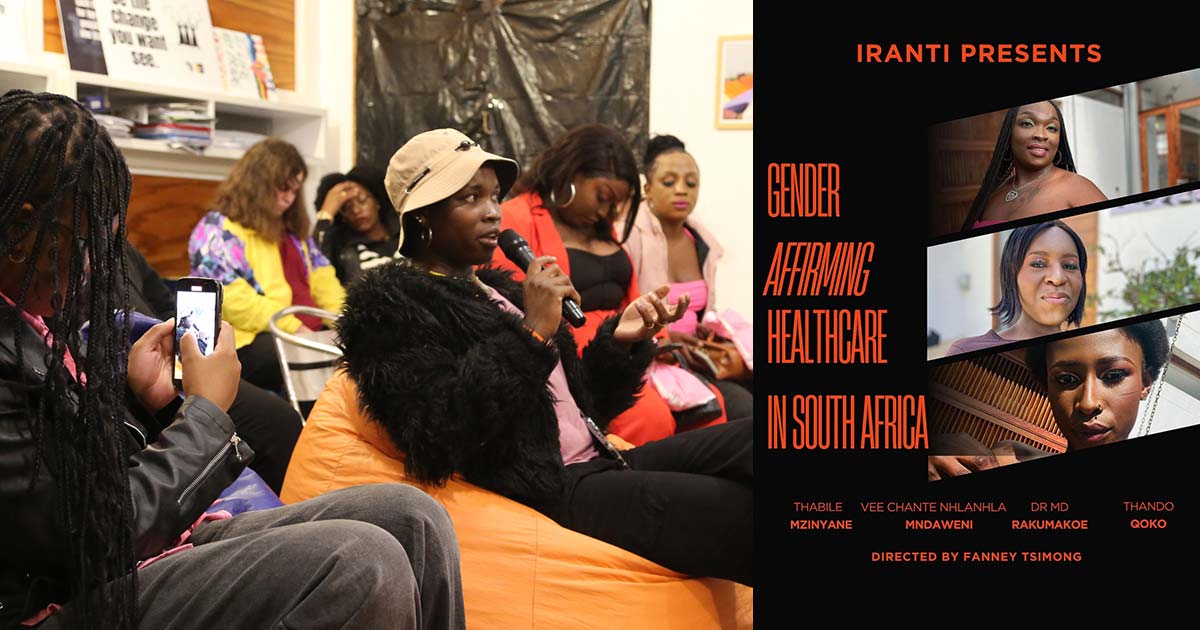Doccie Shines Light on Barriers to Gender-Affirming Healthcare in South Africa

The documentary, which paints a vivid picture of the many barriers transgender women face when seeking gender-affirming healthcare, was screened in Johannesburg on Friday. (Photo: Iranti)
Iranti, a Johannesburg-based organisation advocating for LBTQ+ human rights, hosted the screening of a deeply moving film this past week that highlights the critical need for accessible gender-affirming healthcare in South Africa.
Held in a spirit of storytelling, reflection, and advocacy, the event showcased the half-hour documentary that places transgender voices at the centre of the conversation.
Voices of Transgender Women Amplified
The film, produced by Iranti and directed by Fanney Tsimong, features the lived experiences of six transgender women navigating South Africa’s public healthcare system. Through raw and intimate interviews, the documentary paints a vivid picture of the systemic barriers, stigma, and lack of understanding these women face when seeking gender-affirming care.
From long waiting periods and bureaucratic red tape to a shortage of informed healthcare professionals, the film sheds light on how the current system often leaves trans individuals feeling invisible and dehumanised. Yet, amidst the struggles, their stories also shine with resilience, community, and a longing for dignity and respect.
One of the participants, Rethabile Magoete, spoke candidly about her experience. “The delays I experienced at the hospital have affected me a lot. I’m not happy with my journey because there were delays in getting access to Bara [Chris Hani Baragwanath Hospital],” she said.
Magoete added, “I love this documentary because it’s there to educate you on challenges we face in the public sector. I hope those who watch it can help with bringing change.”
Lack of Understanding Among Healthcare Workers
The documentary also shares other distressing experiences, such as that of Thando Qoko. “Most healthcare practitioners don’t understand transgender people. I had a stomach ache and when I got there, they gave me a pregnancy test to test if I’m pregnant,” she recalled.
Lesedi Ramotsamai urged for more awareness from public servants, saying, “I would love for the government to inform their workers that there are trans people and that they shouldn’t delay our rights.” Maya Sebopelo added, “Our transgender reassignment surgery needs to be prioritised because we are also important.”
A medical perspective is included in the film through the voice of Dr Dulcy Rakumakoe of Quadcare, who states: “Stigma and discrimination exist in healthcare. We were taught technical medicine, but we are hardly taught to be human.” She continues, “Gender-affirming healthcare is not prioritised, especially in the public sector, because I think it’s an issue of sensitisation.”
A Call for Transformation in Public Health
According to Iranti’s Media Officer, Mogau Makitla, the documentary was born out of a need to bring visibility to repeated complaints from trans individuals.
“We had a number of people telling us about the challenges they faced in trying to access gender-affirming care in the public sector. A lot of these issues ranged from not being able to access healthcare professionals, or being on the waiting list for years,” Makitla explained.
“We wanted to use this documentary as an opportunity to bring those stories to the forefront—to let people who might not be knowledgeable about the unique challenges that transgender people face, to bring this information to them.”
Iranti’s documentary serves not only as a mirror reflecting painful truths but also as a tool to educate, disrupt bias, and call for the urgent transformation of public healthcare services to meet the needs of all South Africans.
Watch the full documentary below.
Leave a Reply